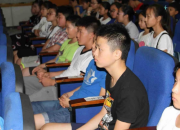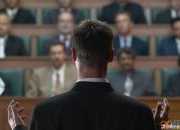英语作文写作的需要背诵的部分
时间:2021-08-31下面的材料旨在丰富学生在是非问题写作方面的思想和语言,考生在复习时可以先分类阅读这些篇章,然后尝试写相关方面的作文题。
对于素材中用黑体字的部分,特别建议你熟读,背诵,因为它们在语言和观点上都值得吸收。学习语言的`人应该明白,表达能力和思想深度都靠日积月累,潜移默化。从某种意义上说,提高英语写作能力无捷径可走,你必须大段背诵英语文章才能逐渐形成语感和用英语进行表达的能力。这一关,没有任何人能代替你过。
I can think in English now!
1.?????? Proverbs
A graduation ceremony is an event where the commencement speaker tells thousands of students dressed in identical caps and gowns that individuality is the key to success.
. The primary purpose of a liberal education is to make one’s mind a pleasant place in which to spend one’s time.
. Next in importance to freedom and justice is popular education, without which neither freedom nor justice can be permanently maintained.
. The classroom--not the trench--is the frontier of freedom now and forevermore.
. Education’s purpose is to replace an empty mind with an open one.
. It is the purpose of education to help us become autonomous, creative, inquiring people who have the will and intelligence to create our own destiny.
. You see, real ongoing, lifelong education doesn’t answer questions; it provokes them.
. People will pay more to be entertained than educated.
.the most important function of education at any level is to develop the personality of the individual and the significance of his life to himself and to others. This is the basic architecture of a life; the rest is ornamentation and decoration of the structure.
. The essence of our efforts to see that every child has a chance must be to assure each as equal opportunity, not to become equal, but to become different-to realize whatever unique potential of body, mind, and spirit he or she possesses.
. A great teacher never strives to explain his vision-he simply invites you to stand beside him and see for yourself.
If you can read and don’, you are an illiterate by choice.
2. Damaging Research
A study by National Parent-Teacher Organization revealed that in the average American school, eighteen negatives are identified for every positive that is pointed out. The Wisconsin study revealed that when children enter the first grade, 80 percent of them feel pretty good themselves, but by the time they get to the sixth grade, only 10 percent of them have good self-images.
3. Education and Citizenship
An important aspect of education in the United States is the relationship between education and citizenship. Throughout its history this nation has emphasized public education as a means of transmitting democratic values, creating equality of opportunity, and preparing new generations of citizens to function in society. In addition, the schools have been expected to help shape society itself. During the 1950s, for example, efforts to combat racial segregation focused on the schools. Later, when the Soviet Union launched the first orbiting satellite, American schools and colleges came under intense pressure and were offered many incentives to improve their science and mathematics programs so that the nations would not fall behind the Soviet Union in scientific and technological capabilities.
Some feel that children should be taught basic job-related skills; still others believe education should not only prepare children to compete in society but also help them maintain their cultural identity (and, in the case of Hispanic children, their language). On the other hand, policymakers concerned with education emphasize the need to increase the level of student achievement and to improve parents in their children’s education.
Some reformers and critics have called attention to the need to link formal schooling with programs designed to address social problems. Sociologist Charles Moscos, for example, is a leader in the movement to expand programs like the Peace Corps, Vista, and Outward Bound into a system of voluntary national service. National service, as Moscos defines it, would entail “the full-time undertaking of public duties by young people whether as citizen soldiers or civilian servers-who are paid subsistence wages” and serve for at least one year. In return for this period of service, the volunteers would receive assistance in paying for college or other educational expenses.
Advocates of national service and school-to-work programs believe that education does not have to be confined to formal schooling. In devising strategies to provide opportunities for young people to serve their society, they emphasize the educational value of citizenship experiences gained outside the classroom. At this writing there is little indication that national service will become a new educational institution in the United States, although the concept is steadily gaining support among educators and social critics.
4. The Teacher’s Role
Given the undeniable importance of classroom experience, sociologists have done a considerable amount of research on what goes on in the classroom. Often they start from the premise that, along with the influence of peers, students’ experiences in the classroom are of central importance to their later development. One study examined the impact of a single first-grade teacher on her students’ subsequent adult status. The surprising results of this study have important implications. It is evident that good teachers can make a big difference in children’s lives, a fact that gives increased urgency to the need to improve the quality of primary-school teaching. The reforms carried out by educational leaders like James Comer suggest that when good teaching is combined with high levels of parental involvement the results can be even more dramatic.
Because the role of the teacher is to change the learner in some way, the teacher-student relationship is an important part of education. Sociologists have pointed out that this relationship is asymmetrical or unbalanced, with the teacher being in a position of authority and the student having little choice but to passively absorb the information provided by the teacher. In other words, in conventional classrooms there is little opportunity for the students to become actively involved in the learning process. On the other hand, students often develop strategies for undercutting the teacher’s authority: mentally withdrawing, interrupting, and the like. Hence, much current research assumes that students and teachers influence each other instead of assuming that the influence is always in a single direction.











